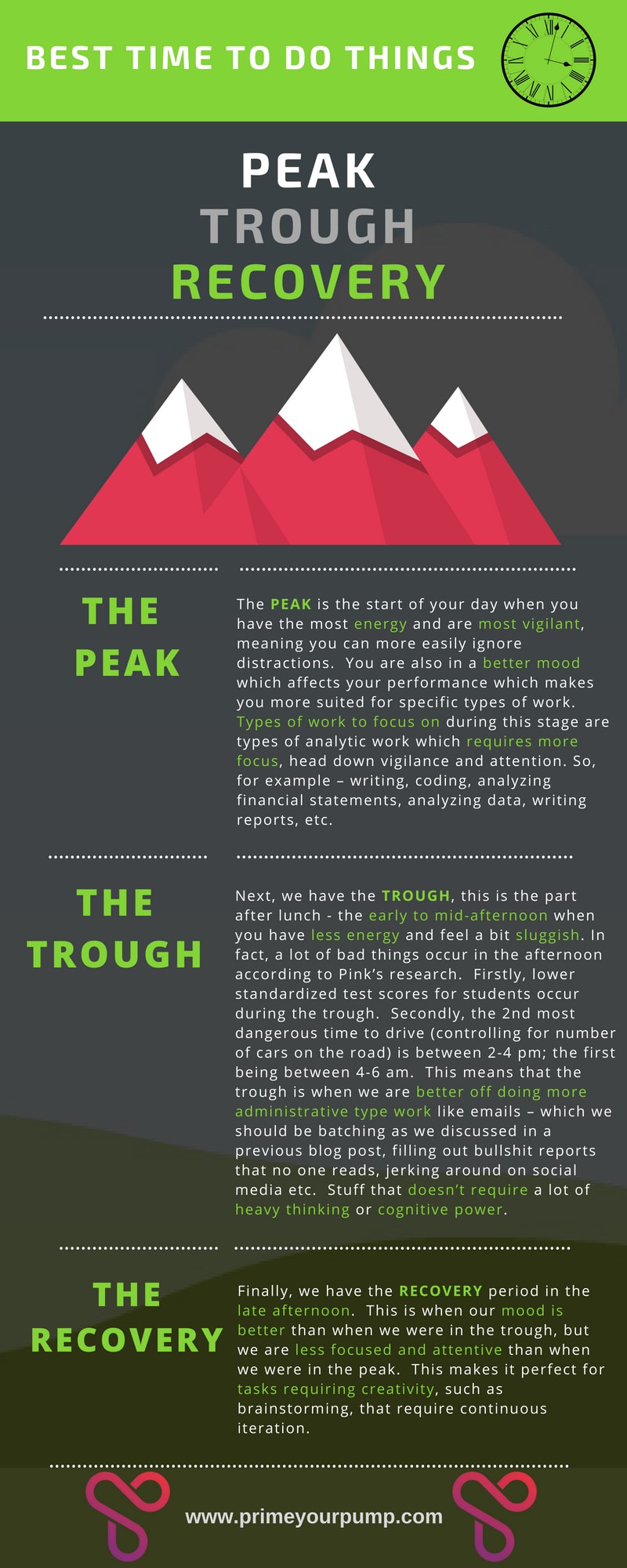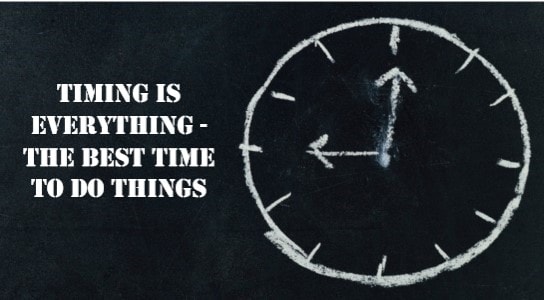Timing is Everything – The Best Time to Do Things

I just had a healthy lunch and I’m sitting here trying to figure out what to write about for this blog post. Unfortunately, my creative juices aren’t so juicy, and nothing seems to be coming to me.
Hmmm, I guess I just will catch up on some emails and do some PYP promotional outreach on social media for a bit.
Fast forward to later in the afternoon…
I’m sitting here at Starbucks and for some reason, I am feeling much more creative and curious.
On an aside, the people watching in Miami is fantastic.
Interestingly, some girl just walked by and her butt is noticeably more ‘shapely’ than it was the last time I saw her a couple months ago. Either she has been hitting the squats like a beast, or being that it is Miami, she probably had surgery to get some butt implants.
By the way, speaking of surgery – do you ever wonder why most surgeries start at the ass crack of dawn? I did too until I started my previous job as a curious healthcare administrator, where I found out the answer. Turns out there are some good reasons, just like there are some good reasons why there is a best time of day to do certain things in your life.
That’s right, today I am going to show you how you can optimize your day with the precision of a surgeon!
On second thought, you know what, I think I will wait until tomorrow morning to write this article.
Ok, I’m back
I had a good sleep, feel rested and energized and am ready to do some writing.
Where were we? Oh yeah, surgeries…
Why do most surgeries start early in the morning?
Is it because the surgeons want to make sure they make their afternoon tee-off times?
Possibly, but surprisingly (a little dig at my surgeon friends) that’s not the main reason.

Why Do Surgeries Start So Early?
There are many reasons why surgeries start so early, some being:
Fasting – Patients need to fast before undergoing anesthesia so that they don’t puke and choke on it due to nausea. Gross? Yes, but it is a significant surgical risk. By having surgeries early, it decreases the time patients need to fast, also meaning they won’t be as cranky and irritable due to being hungry!
Complications – If something goes sideways during the surgery, there are more hands-on-deck to help than later in the day. Additionally, a study done by Duke University showed more anesthesia-related problems in the afternoon: ‘The difference was sizable: the probability of certain types of problems was more than four times as great for operations beginning at 4 p.m. as for those beginning at 9 a.m. The scientists were unsure why this was so, but they offered several possible explanations, including fatigue or sleepiness in doctors and staff members. Shift changes or increased caseloads later in the day may also have been a factor.’
Patient prep time – It takes time to get the patient prepped (registration, seen by various people, premeds given, possibly having lines put in etc.). So, starting that process earlier helps make it fit with the typical hospital workday of 7:30-5:30.
Delays – Many times there are surgery delays, which have a ripple effect to the rest of the day. So, starting early gives time to make up for delays.
Financial impact – Having surgery early means patients spend less time as an inpatient, which decreases costs to the hospital.
Doctors have busy schedules – They block certain times per week for surgeries, clinic consults, rounding, and of course, golf (sorry couldn’t resist).
Performance – Surgeons are more vigilant, alert, focused and energized early in the morning.
Although all of the reasons above are important, we are going to focus on the last one because it doesn’t just apply to surgeons, it applies to all of us!
Why? Because the research tells us that the combination of time of day + type of work being done + type of person all combined have an impact on human performance.
What Does the Research Tell Us About Time of Day?
According to Daniel Pink, who has recently come out with a new book titled “When: The Scientific Secrets of Perfect Timing.”, most people move through their day in 3 stages.
Our cognitive abilities change throughout the day and how we perform all depends on what we are doing and the stage we are in.
According to Pink in an interview with NPR2, “Well, what you see in – like in a lot of this research and big data, you see systematically poor performance in health care settings in the afternoon. Example – the incidence of handwashing inside of hospitals dramatically drops in the afternoon. You look at colonoscopies – endoscopists find half as many polyps in colonoscopies in afternoon exams versus morning exams even with the same population – doctors more likely to prescribe unnecessary antibiotics in the afternoon than in the morning.”
What Are the Stages?
The three stages are as follows: a peak, a trough and a recovery. People who are night owls move through the day in the opposite order – recovery, trough, peak.

Listen to This!
What really hit home for me is when Pink said on Tim Ferriss’ podcast, “the research shows that time of day explains about 20% of the variation in how people perform on cognitive tasks”. Meaning if you take two people and try to explain the difference in their cognitive ability, 20% is due to the time of day, which is huge!
Use It or Lose It: How Can You Use the Best Time of Day to Your Advantage?
It’s quite simple to make this stuff actionable, just do the following: (assuming you are a morning person, if you are a night-owl – just do them in reverse)
(1) Move your analytic work to the morning hours when you are more focused and vigilant.
(2) Do your administrative tasks in the early afternoon after lunch when your energy levels are lower and you aren’t as focused.
(3) Perform your creative work in the late afternoon when your mood is on the upswing and when your focus is a bit looser.
Another tip from Pink is to schedule meetings not based on people’s availability but the type of meetings being convened (are they analytical? are they about policies and procedures? do they need creativity?) and what type of people will be there (are they morning people? are they night owls?).
So, before you schedule a meeting, really take some time to think about the best time to have it.
That’s It!
I was able to crank this article out in a couple hours, being fresh and rested and doing it at the best time really made a huge difference. Time for lunch, then some administrative work in the early afternoon.
But not before I have a ‘nappuccino’. Yup, that’s right, a coffee then a nap. According to Pink having naps between 10-20 minutes has you waking up more alert with better mental function than before. And caffeine takes over 20 minutes to kick in, so it takes effect just as you wake up.
“Is there a best time for naps?”, you ask. I don’t need to do any research to answer that one – the best time for naps is…anytime! (actually Pink says it’s roughly 7 hours after you wake up)
Until next time, use your best time wisely, sweet dreams and as always…PYMFP!
–Rick
P.S. The best time to share this post with people you care about who could use it? Now!
If you enjoyed this post, it would mean the world to us if you shared it via any of the social media platforms below!
Popular Previous Posts:
How to Improve Your Life By Understanding Different Perspectives
How to Save Money and Time By Living Like Goldilocks
Procrastination and Seinfeld – What is the ‘Link’?
How the Average Wedding Cost Can Help You Budget For Your Big Day
How to Clear Your Mind and Get Out of Your Head
One Thing You Can Do Every Day That Will Improve Your Life
10 Practical Lessons Learned From an Amazing Show
Looking for Love? How to Make Your Love Life Measure Up!
How to Get a Six Pack Like Me Using This Simple Principle!
Body Language Secrets for Each Zodiac Sign
References
https://tim.blog/2018/03/25/daniel-pink/
1 Oh What a Beautiful Morning! The Time of Day Effect on the Tone and Market Impact of Conference Calls. Jing Chen. *. Elizabeth Demers. €. Baruch Lev π. May 2013. *. Stern School of Business, New York University,
When: The Scientific Secrets of Perfect Timing by Daniel Pink
http://qualitysafety.bmj.com/content/15/4/258

